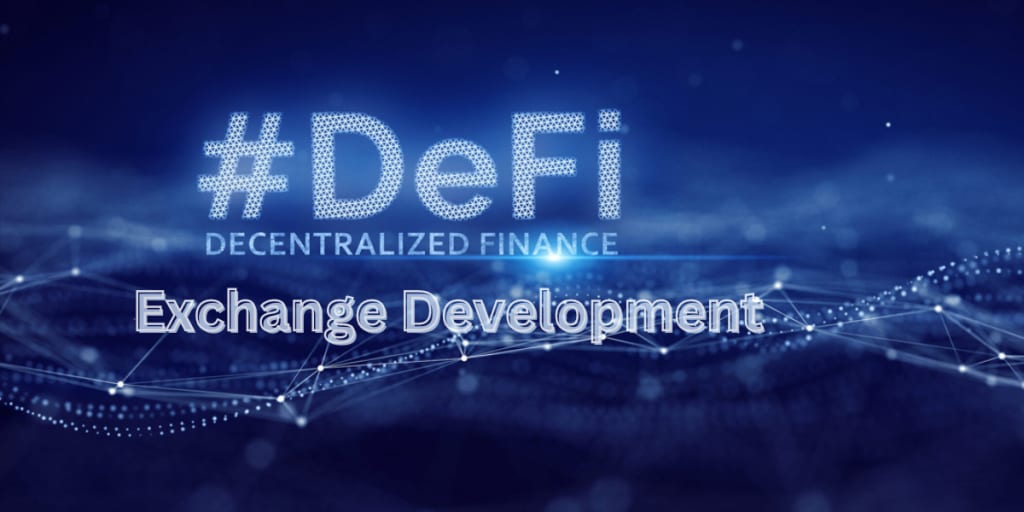Exploring DeFi Exchange Development
The Future of Trading

The advent of decentralized finance (DeFi) has transformed the financial landscape, revolutionizing how we trade and interact with assets. At the forefront of this transformative movement is the development of DeFi exchanges. These platforms leverage blockchain technology to create decentralized, transparent, and accessible trading environments, challenging traditional centralized exchanges. DeFi exchange development holds immense potential for reshaping the future of trading, offering users greater control over their assets, improved liquidity through automated market makers, and novel opportunities for financial inclusion.
Understanding DeFi Exchanges
DeFi exchanges are platforms that enable users to trade digital assets directly without intermediaries. Unlike traditional exchanges, which rely on centralized authorities, DeFi exchanges operate on blockchain networks, utilizing smart contracts to automate transactions. This decentralized nature eliminates the need for intermediaries such as brokers or clearinghouses, allowing users to maintain control over their assets throughout the trading process.
One of the defining features of DeFi exchanges is transparency. Every transaction is recorded on a public blockchain, providing users with real-time access to trading history and enabling greater visibility into the exchange's operations. Additionally, DeFi exchanges are accessible 24/7, allowing users from around the world to engage in trading at any time, regardless of their geographic location or time zone.
The Rise of Automated Market Makers (AMMs)
- AMMs are protocols that use liquidity pools instead of traditional order books for trading.
- Liquidity providers lock their assets into these pools, which are used to execute trades based on predefined mathematical algorithms.
- Improved liquidity is a key advantage of AMMs as they pool together assets from various users, ensuring sufficient liquidity for trades.
- This addresses the challenge of low liquidity and reduces slippage, leading to more favourable trading conditions.
- AMMs enable seamless token swaps by automatically calculating the optimal exchange rate based on the pool's liquidity.
- Users can swap tokens directly without needing a counterparty, enhancing accessibility and convenience.
- Popular AMM protocols in the DeFi ecosystem include Uniswap, known for its user-friendly interface, SushiSwap with additional features like yield farming and staking, and PancakeSwap, which operates on the Binance Smart Chain and offers lower transaction fees.
- AMMs have revolutionized the efficiency and accessibility of trading in DeFi exchanges, making them a preferred choice for many traders in the decentralized finance space.
The Importance of Security and Auditing
- DeFi exchanges introduce new security challenges despite their exciting opportunities.
- Smart contracts, the backbone of DeFi applications, can contain vulnerabilities that hackers exploit to syphon funds.
- Ensuring the security of DeFi exchanges is of paramount importance to protect user funds.
- Rigorous security measures and audits are essential to mitigate risks.
- Security audits involve assessing the code and architecture of smart contracts to identify vulnerabilities and weaknesses.
- Reputable third-party firms specializing in blockchain security typically conduct these audits.
- Independent auditing fosters trust and confidence in the DeFi ecosystem.
- Users can be reassured by professional security reviews validating the implemented measures.
- Transparency and disclosure of audit reports allow the community to scrutinize security practices.
- DeFi exchanges must continuously update their security practices and respond swiftly to identified vulnerabilities.
- Proactive security measures include regular code audits, bug bounties, and collaborations with cybersecurity experts.
- The dynamic nature of the blockchain ecosystem requires ongoing vigilance to address emerging threats and vulnerabilities.
Regulatory Considerations and Future Outlook
- DeFi exchanges are attracting attention from regulatory bodies due to their prominence in the financial landscape.
- Regulatory frameworks for DeFi are still in the early stages of development due to the unique challenges posed by the decentralized and global nature of these exchanges.
- Balancing innovation and consumer protection is crucial in regulatory considerations for DeFi.
- Governments and regulatory bodies need to adapt existing frameworks or create new ones to encompass the decentralized nature of DeFi while safeguarding against fraud, money laundering, and market manipulation.
- Collaboration between DeFi and traditional finance is of interest to bridge gaps in the financial ecosystem.
- Partnerships between DeFi exchanges and regulated financial institutions can facilitate the flow of assets and liquidity, enabling seamless transitions between decentralized and centralized systems.
- The future of DeFi exchanges is promising with the development of scalability solutions such as layer-two protocols and sidechains to address blockchain scalability limitations and enable higher transaction throughput.
- Interoperability protocols aim to connect different blockchain networks, allowing for the seamless transfer of assets and liquidity.
- Enhanced user experiences, improved user interfaces, and educational initiatives will drive the adoption of DeFi exchanges among mainstream users.
- DeFi exchanges have the potential to promote financial inclusion by providing access to financial services for the unbanked and underbanked populations.
- The democratization of markets allows individuals to participate in investments and wealth creation that were previously restricted to a select few.
Conclusion
DeFi exchange development is reshaping the trading landscape by offering a decentralized and transparent alternative to traditional platforms. DeFi exchanges enable users to trade directly, eliminate intermediaries, and provide greater accessibility and control over assets. The rise of AMM has revolutionized liquidity provision and token swaps, enhancing efficiency and accessibility for traders. Security and auditing are critical to ensure the reliability of DeFi exchanges, and collaborations between DeFi and traditional finance can unlock new opportunities. As the DeFi ecosystem continues to evolve, scalability solutions, regulatory frameworks, and a focus on user experience will shape the future of DeFi exchanges and their transformative impact on global finance.





Comments
There are no comments for this story
Be the first to respond and start the conversation.